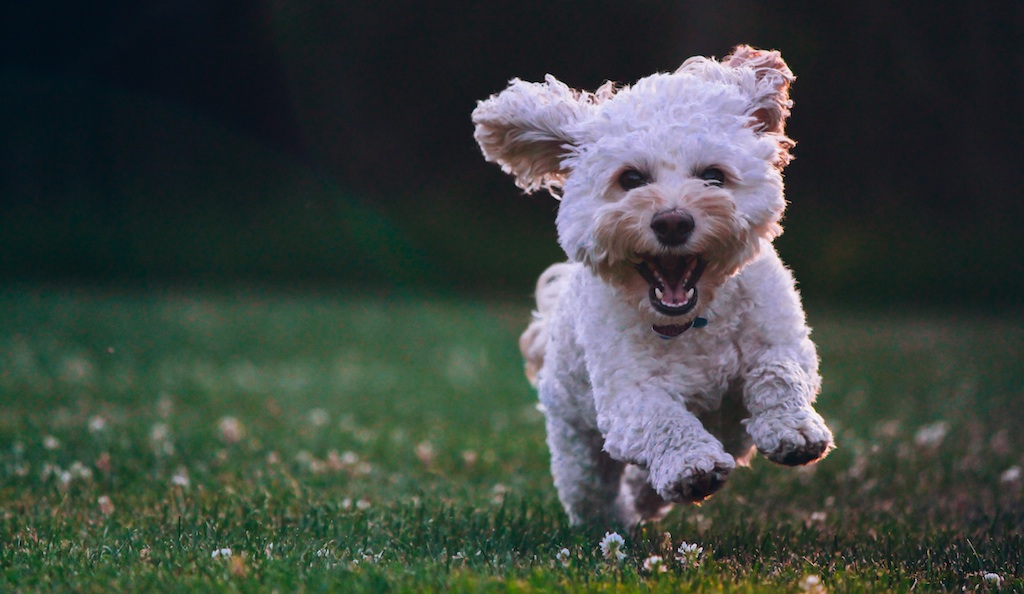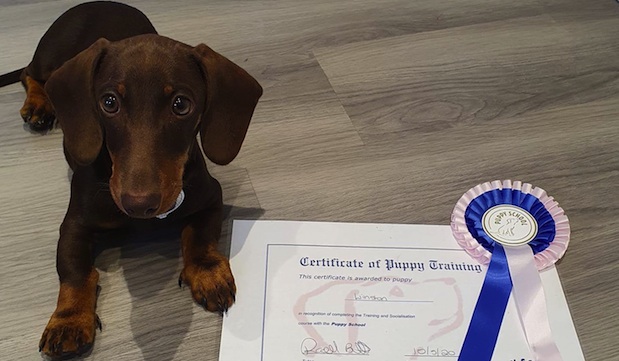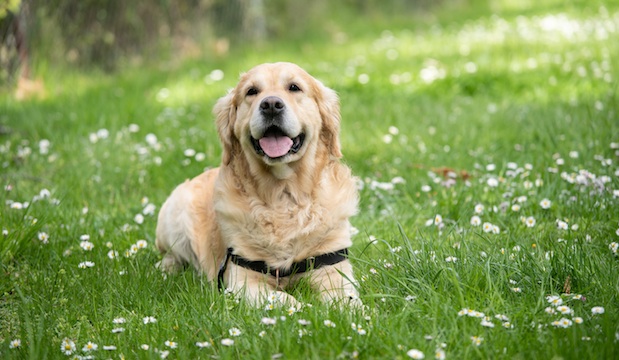New puppy? Online dog training could be the future…
How to train your dog online
Chances are you have at least one friend or Instagram follower currently
taunting you with pictures of their new four-legged friend. According to canine welfare organisation The Kennel Club, searches on its website for new puppies increased by 53% between February and March, with the biggest spike in the week leading up to the official lockdown.
Training a puppy is notoriously time-consuming and something many people feel unable to commit to while working full-time outside the home. It’s unsurprising, then, that so many have used this period at home to fulfil their dreams of getting a dog.

In the age of social distancing, seeking professional help to train your pup might prove tricky, what with all the handling involved. But the spike in searches for new puppies has been coupled with a second spike: a demand for online dog training. Here’s what the experts have to say about it...
Is now the time to get a puppy?
‘With so many more people working from home at the moment, it’s understandable why they might feel that now is the perfect time to welcome a puppy into their home,’ says Bill Lambert, head of health and welfare at The Kennel Club. ‘However, they should consider the impact on their lifestyle that comes with a puppy, which will need a lot of attention and will cause a lot of disruption to work patterns,’ he adds, pointing out that if and when owners return to working outside the home, their puppy could end up with no company during the day.

Lambert cautions that times like these, when our usual routines have been compromised and we’ve temporarily been forced to adopt a more confined lifestyle, might not be the right time to make the more long-term commitment of looking after a dog. ‘We strongly advise people to think beyond the current time and remember that a puppy will be sharing their home for the next 12 years or so,’ he says.
Ryan Neile, head of animal behaviour at Blue Cross, agrees, adding that the current social-distancing measures have made socialising puppies more challenging than usual. ‘While we believe lots of people who have taken on a puppy during lockdown have more time to get going on their training, it is vital puppies don’t miss out on what was normal life and still get socialised as much as possible with the outside world,’ he says, recommending new owners check out the Blue Cross’s vlog series on socialising puppies during lockdown.
Is it possible to train a dog online?

The Puppy School is now offering online dog training classes
Gwen Bailey, director at Puppy School, believes that now is a great time to train a dog and is confident in the ability of online lessons to do the job. ‘Online puppy classes are amazing! Even we were sceptical at first but we found it works really well,’ she says. ‘Puppies are more relaxed in their own home so they learn faster, classes are smaller by necessity, and so coaching is individual and works easily, and owners absolutely love the inspiration and motivation it gives them to get on with their puppy’s training.’
Bailey and her team at Puppy School started offering online dog training only when the lockdown happened. The virtual lessons proved instantly popular – with owners as far away as the US and Canada tuning in to watch.
‘Many owners were hoping to wait for face-to-face classes to restart, but we’ve noticed a surge of bookings as people have begun to realise that restrictions are going to continue for some time,’ she says. ‘Our style of training, which is demo and teach, with owners practising as we coach, works really well online.’

The Kennel Club has also begun offering lessons online. ‘It’s important to maintain a routine to make sure [dogs] are kept mentally and physically active, and it’s a great opportunity to start training early,’ says Lambert.
What are the main hurdles with online dog training?
As Neile at Blue Cross pointed out, socialising a puppy in the current climate can be difficult. Training a dog online denies them a level of interaction with the outside world that’s beneficial for their healthy development.
‘The biggest downside is that puppies don’t get social contact with each other, and don’t get used to being in a hall, being around children and all the other things they would get from face-to-face classes,’ explains Bailey. ‘Our tutors also don’t get any cuddles with the lovely puppies that attend class and we really miss that.’

Another hurdle Bailey and her colleagues have experienced with virtual lessons is the technological hiccups. ‘We can cope in most areas but in more remote places where neither trainer nor owner has good broadband speed, things can get tricky,’ she says. ‘We always do a brief technology meeting before class with each client to iron out any difficulties and to help them set up their camera so we can see them train, and that helps a lot.’
Can dog training still take place in person, in public spaces?
While the current government advice is that people can travel to work if necessary, many dog trainers and schools are choosing to remain closed for safety reasons. Lambert points out that the rules may also differ depending on where in the UK you live.
Wherever you are, Lambert says, ‘you must adhere to strict social distancing and hygiene rules at all times, including keeping at least two metres apart from others and washing your hands thoroughly before and after handling your dog.’

Puppy School, which typically teaches group classes, is not currently running lessons in physical form. ‘Groups of people are not currently allowed, but if and when they are, many precautions will have to be taken,’ Bailey says, pointing out that the biggest problem is trainers handling puppies for demonstrations and then handing them back to the owners. ‘Training puppies in surgical gloves is not going to be easy. Until we can do this safely and we are sure that there is no risk to us or our clients, we will be staying online.’
Caring for your dog in the ‘new normal’ climate
The ongoing social restrictions aren’t affecting only those looking to train new puppies. All owners are now having to contend with new measures to ensure their dogs don’t come into close contact with others in the park, often keeping them on leads in spaces where they would previously have been allowed to roam free.

‘Dogs that are used to getting more exercise or enjoy running around off the lead might need a bit of extra time at home to play and train, to keep them physically and mentally stimulated,’ says Neile, adding that the Blue Cross website has a special section dedicated to advice on caring for your pet during the pandemic.
For Bailey and her colleagues at Puppy School, discovering the wealth of possibilities that comes with online dog training has been a silver lining to the outbreak. ‘It’s so inclusive and allows those who are less physically or socially able to attend classes to do so,’ she says. ‘It's something we will definitely continue to offer after lockdown.’
Training a puppy is notoriously time-consuming and something many people feel unable to commit to while working full-time outside the home. It’s unsurprising, then, that so many have used this period at home to fulfil their dreams of getting a dog.

In the age of social distancing, seeking professional help to train your pup might prove tricky, what with all the handling involved. But the spike in searches for new puppies has been coupled with a second spike: a demand for online dog training. Here’s what the experts have to say about it...
Is now the time to get a puppy?
‘With so many more people working from home at the moment, it’s understandable why they might feel that now is the perfect time to welcome a puppy into their home,’ says Bill Lambert, head of health and welfare at The Kennel Club. ‘However, they should consider the impact on their lifestyle that comes with a puppy, which will need a lot of attention and will cause a lot of disruption to work patterns,’ he adds, pointing out that if and when owners return to working outside the home, their puppy could end up with no company during the day.

Lambert cautions that times like these, when our usual routines have been compromised and we’ve temporarily been forced to adopt a more confined lifestyle, might not be the right time to make the more long-term commitment of looking after a dog. ‘We strongly advise people to think beyond the current time and remember that a puppy will be sharing their home for the next 12 years or so,’ he says.
Ryan Neile, head of animal behaviour at Blue Cross, agrees, adding that the current social-distancing measures have made socialising puppies more challenging than usual. ‘While we believe lots of people who have taken on a puppy during lockdown have more time to get going on their training, it is vital puppies don’t miss out on what was normal life and still get socialised as much as possible with the outside world,’ he says, recommending new owners check out the Blue Cross’s vlog series on socialising puppies during lockdown.
Is it possible to train a dog online?

The Puppy School is now offering online dog training classes
Gwen Bailey, director at Puppy School, believes that now is a great time to train a dog and is confident in the ability of online lessons to do the job. ‘Online puppy classes are amazing! Even we were sceptical at first but we found it works really well,’ she says. ‘Puppies are more relaxed in their own home so they learn faster, classes are smaller by necessity, and so coaching is individual and works easily, and owners absolutely love the inspiration and motivation it gives them to get on with their puppy’s training.’
Bailey and her team at Puppy School started offering online dog training only when the lockdown happened. The virtual lessons proved instantly popular – with owners as far away as the US and Canada tuning in to watch.
‘Many owners were hoping to wait for face-to-face classes to restart, but we’ve noticed a surge of bookings as people have begun to realise that restrictions are going to continue for some time,’ she says. ‘Our style of training, which is demo and teach, with owners practising as we coach, works really well online.’

The Kennel Club has also begun offering lessons online. ‘It’s important to maintain a routine to make sure [dogs] are kept mentally and physically active, and it’s a great opportunity to start training early,’ says Lambert.
What are the main hurdles with online dog training?
As Neile at Blue Cross pointed out, socialising a puppy in the current climate can be difficult. Training a dog online denies them a level of interaction with the outside world that’s beneficial for their healthy development.
‘The biggest downside is that puppies don’t get social contact with each other, and don’t get used to being in a hall, being around children and all the other things they would get from face-to-face classes,’ explains Bailey. ‘Our tutors also don’t get any cuddles with the lovely puppies that attend class and we really miss that.’

Another hurdle Bailey and her colleagues have experienced with virtual lessons is the technological hiccups. ‘We can cope in most areas but in more remote places where neither trainer nor owner has good broadband speed, things can get tricky,’ she says. ‘We always do a brief technology meeting before class with each client to iron out any difficulties and to help them set up their camera so we can see them train, and that helps a lot.’
Can dog training still take place in person, in public spaces?
While the current government advice is that people can travel to work if necessary, many dog trainers and schools are choosing to remain closed for safety reasons. Lambert points out that the rules may also differ depending on where in the UK you live.
Wherever you are, Lambert says, ‘you must adhere to strict social distancing and hygiene rules at all times, including keeping at least two metres apart from others and washing your hands thoroughly before and after handling your dog.’

Puppy School, which typically teaches group classes, is not currently running lessons in physical form. ‘Groups of people are not currently allowed, but if and when they are, many precautions will have to be taken,’ Bailey says, pointing out that the biggest problem is trainers handling puppies for demonstrations and then handing them back to the owners. ‘Training puppies in surgical gloves is not going to be easy. Until we can do this safely and we are sure that there is no risk to us or our clients, we will be staying online.’
Caring for your dog in the ‘new normal’ climate
The ongoing social restrictions aren’t affecting only those looking to train new puppies. All owners are now having to contend with new measures to ensure their dogs don’t come into close contact with others in the park, often keeping them on leads in spaces where they would previously have been allowed to roam free.

‘Dogs that are used to getting more exercise or enjoy running around off the lead might need a bit of extra time at home to play and train, to keep them physically and mentally stimulated,’ says Neile, adding that the Blue Cross website has a special section dedicated to advice on caring for your pet during the pandemic.
For Bailey and her colleagues at Puppy School, discovering the wealth of possibilities that comes with online dog training has been a silver lining to the outbreak. ‘It’s so inclusive and allows those who are less physically or socially able to attend classes to do so,’ she says. ‘It's something we will definitely continue to offer after lockdown.’
TRY CULTURE WHISPER
Receive free tickets & insider tips to unlock the best of London — direct to your inbox